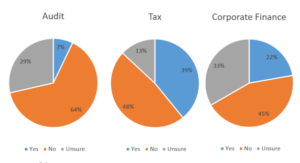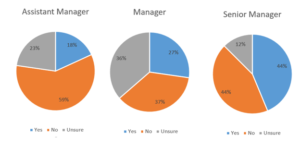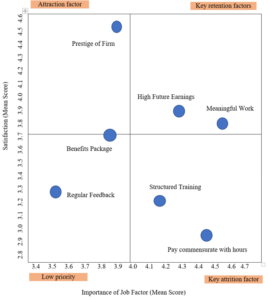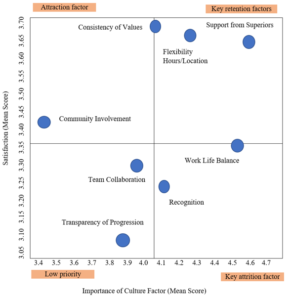In the second in this series of blogs discussing the results of a year-long study into the attitudes of millennial accountants on reaching the top ranks of the Profession, we look at why so many millennial accountants are choosing to leave the Profession at middle management level.
For many years accountancy firms have utilised graduate hiring strategies which reflect the expectation that there will be a high turnover of personnel post-qualification. Indeed many trainee accountants see the profession as a post-post-graduate experience.
However, to fuel the pipeline of future leadership talent required by CA firms against a backdrop of a retiring baby-boomer population of senior Partners, it is becoming increasingly relevant that firms understand how to engage with middle managers to promote the role of Partner as a fulfilling career path.
Our study conducted in conjunction with the University of Strathclyde Business School in 2017 found that service line and job level were distinct differentiating variables to levels of current job satisfaction reported by millennials, and were contributory factors in their aspirations to make Partner.
Responses from the survey of over 150 millennial accountants to the question “Do you aspire to make Partner?” are outlined below. Across all services lines more than half of respondents said “No” or were “Unsure” and in Audit/Assurance this was most pronounced– 64% said “No” – a worrying trend when we consider the likelihood of a potential succession crisis.
Do you aspire to make Partner?
So why are Assistant Managers, and particularly Auditors less inclined to want to progress to the top ranks of the Profession? Our study found that there were key job and cultural factors contributing to the retention/attrition of millennial accountants. The key findings are outlined below using an Importance/Satisfaction Matrix:
Job Factors
Cultural Factors
The findings of the Rutherford Cross study backed up previous academic and popular literature that point to millennials as being driven by meaningful work and work/life balance more than other job or cultural factors.
So, when taking into account the findings that the Audit service line and Assistant Manager level are the least likely to aspire to reach Partner level, perhaps the middle management role itself may need to be revised to retain the top talent? A better balance of commercial experiences and less focus on long hours conducting compliance based tasks could ultimately affect millennials’ career choices. The fact that young accountants often complete their three-year training contract entirely within the audit function rather than training across different areas of accountancy (as happens in the legal profession) may be a contributory factor to Assistant Managers choosing to leave the profession early on in their careers.
In the next instalment of our Blog Series posted on 15th January we will be exploring whether the right skills are being nurtured to fuel the pipeline of talent required. What will the Partner role of the future look like and are firms’ identifying, hiring and coaching the right skills and behaviours to meet the future demands of the Partner role?
We’d like you to get involved in the conversation. We’d like to know:
- Do you aspire to be a Partner in practice?
- Why are you or your peers choosing to leave the profession?
- What skills do you think future leaders in the profession need?
- Is the business model of Partnership attractive to you?
Join in the conversation at @RutherfordXNW using #nextgenleaders #shapingtheprofession #Partnersofthefuture
A full copy of the study is also available on request – [email protected]











